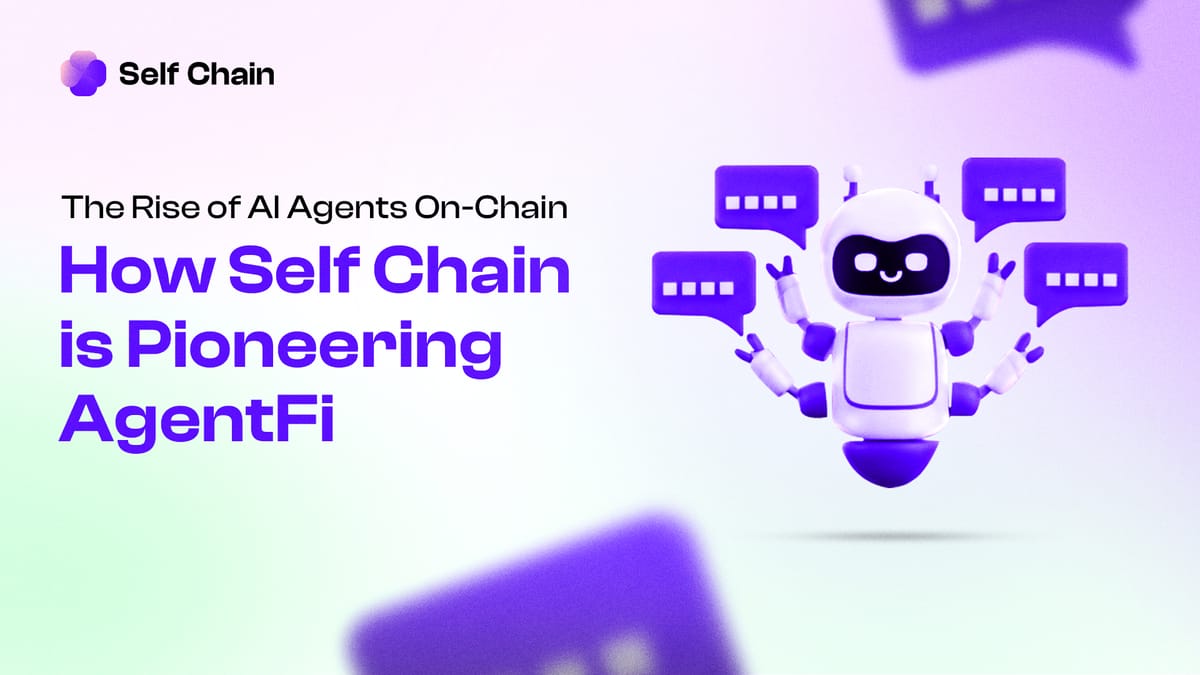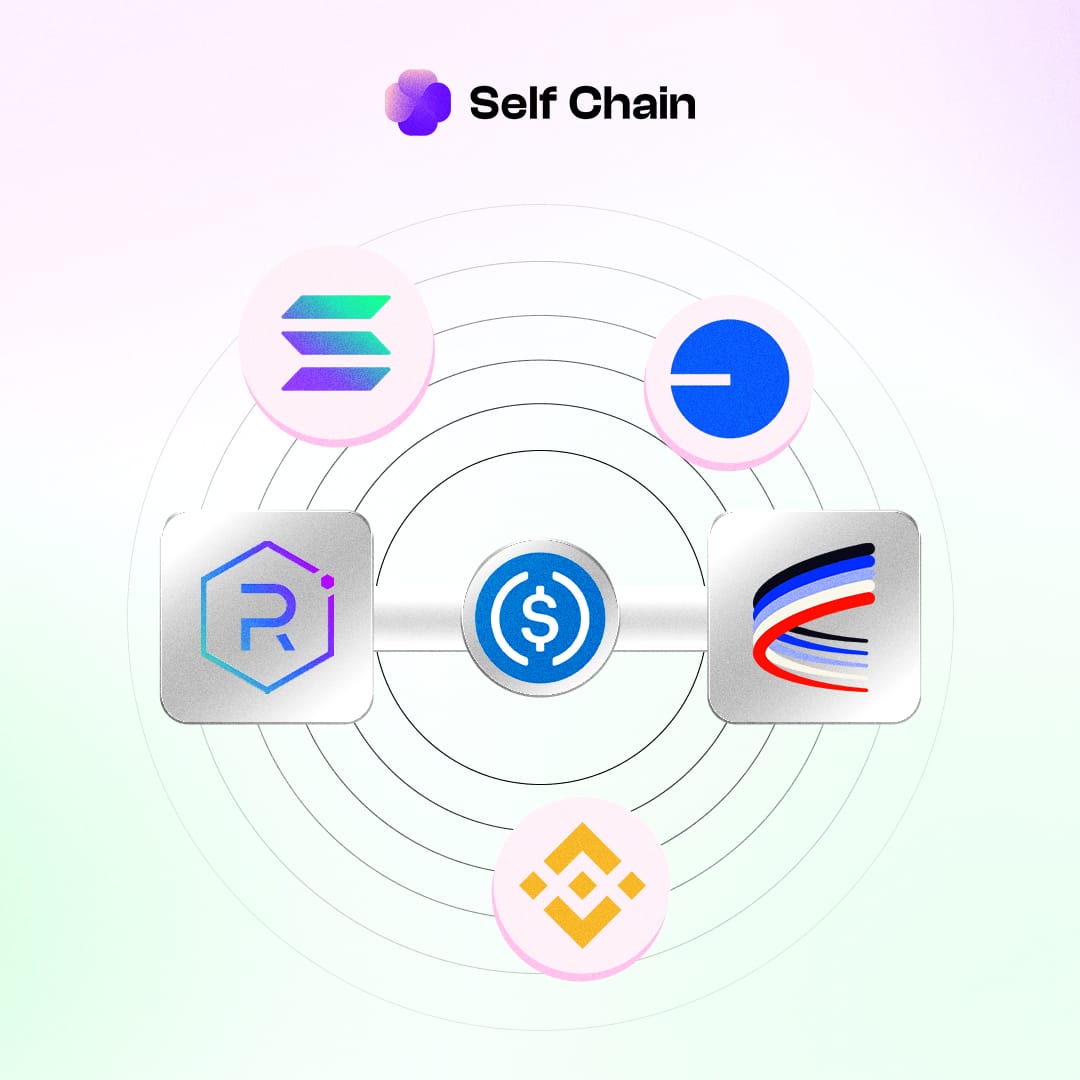The Rise of AI Agents Onchain: How Selfchain is Pioneering AgentFi

The UX of on-chain applications has been a key challenge for DeFi scalability. The integration of AI into on-chain applications is helping automate complex processes, making user interactions more efficient. AgentFi, an agentic system within DeFi, enables autonomous entities to simplify engagement across DeFi, gaming, and social platforms. Leading this evolution is Self Chain, a modular infrastructure built to support and empower the next generation of AI-driven agents, paving the way for a more seamless and intelligent on-chain ecosystem.
Key overview
AI Agents in DeFi – AI-powered agents are transforming on-chain applications, enhancing automation and efficiency.
- From Off-Chain to On-Chain – On-chain AI agents reduce reliance on intermediaries, ensuring trustless, autonomous execution.
- Limitations of Existing Blockchains – High gas fees, liquidity fragmentation, and scalability issues hinder AI agent deployment.
- Self Chain's Innovation – A modular Layer 1 blockchain designed specifically to optimize AI agent execution.
- Core Features – Intent-based architecture, keyless wallets, cross-chain interoperability, and AI-driven data insights.
- Future of On-Chain Agents – Advancing intelligence, real-world integration, autonomous coordination, and governance evolution.
The Growth of AI Agents
The on-chain agent ecosystem has experienced remarkable growth, evolving from simple automation tools to sophisticated autonomous entities capable of complex decision-making. These AI-powered agents represent the next frontier in blockchain technology, combining the transparency and security of distributed ledgers with the intelligence and adaptability of artificial intelligence.
While traditional blockchain automation relies on predetermined triggers and actions, on-chain AI agents leverage advanced algorithms to:
- Dynamically optimize trades across multiple protocols
- Adaptively manage asset portfolios in changing market conditions
- Execute complex, multi-step smart contract interactions without human intervention
The market speaks for itself: the AI agent sector reached $5 billion in 2024 and is projected to grow to $47 billion by 2030. As Jensen Huang, Nvidia's CEO, declared at CES 2025, "AI agents are a multi-trillion-dollar opportunity." The emergence of DeFAI—decentralized finance powered by AI agents—is rapidly redefining what's possible in the crypto landscape.
The Shift from Off-Chain to On-Chain Agent Execution
AI agents are transforming finance by automating complex tasks, improving efficiency, and reducing human intervention. Some key use cases include:
- Algorithmic Trading: Agents analyze market data in real time and execute trades based on predefined strategies.
- Portfolio Management: Personalized investment strategies can be executed automatically based on risk tolerance and market conditions.
- Lending & Credit Scoring: AI agents assess creditworthiness and streamline loan approvals.
- Fraud Detection & Compliance: Agents monitor transactions for anomalies and flag suspicious activities.
However, integrating these agents into traditional finance (TradFi) comes with trust and security challenges. Most AI agents operate within centralized systems, requiring users to trust banks, financial institutions, or third parties. This creates risks of manipulation, censorship, and data breaches. Blockchain and DeFi offer a trustless alternative, where on-chain AI agents can operate transparently, executing financial transactions without intermediaries. However, ensuring security, regulatory compliance, and real-time decision-making in a decentralized setup remains a challenge. This is where specialized infrastructure like Self Chain becomes essential, enabling AI agents to function autonomously while preserving transparency and decentralization.
Why Existing Blockchains Fall Short for AI Agents
While several blockchains have attempted to support AI agent deployment, most face fundamental limitations:

These limitations aren't mere inconveniences—they're fundamental barriers to realizing the full potential of on-chain AI agents. This is precisely why Self Chain was built from the ground up specifically for AI agent operations.
Self Chain: The First Purpose-Built Layer 1 for AI Agents
Self Chain emerges as the first modular intent-centric access Layer 1 blockchain and keyless wallet infrastructure service designed specifically to optimize on-chain agent execution. This purpose-built approach provides unparalleled advantages for AI agent developers and users.
Technical Requirements for On-Chain Agents
Developing and deploying effective on-chain AI agents presents several technical challenges that must be addressed by underlying blockchain infrastructure.
1. Modular Architecture
Modular blockchains break down the traditional monolithic structure into separate layers for execution, consensus, data availability, and settlement. This allows for greater efficiency, scalability, and optimization for specific use cases—particularly AI-driven agent operations.
How Self Chain enables it: Self Chain's architecture uses a three-layer approach to integrate intent into blockchain:
- Dapps Layer: Collects user intentions through conversational LLM interfaces or simple forms
- Intent Search Layer: Captures these intentions and converts them into actionable blockchain queries, finding optimal paths to satisfy user requests
- Intent Solver: Intervenes in transactions after secure signing through TSS, using smart contracts to address user intent and often providing an optimal execution path
This approach significantly reduces blockchain interaction complexity, ensuring intuitive and direct experiences. It enables AI agents to understand and execute user goals efficiently, without requiring users to specify implementation details.
2. Autonomy & Adaptability
AI agents must be fully autonomous, capable of executing complex tasks like trading, lending, and governance without human intervention. Adaptability allows them to adjust strategies based on real-time market conditions.
How Self Chain enables it: Self Chain supports intent-centric execution, allowing AI agents to autonomously interact with smart contracts and DeFi protocols without continuous human input. Its keyless wallet infrastructure enhances autonomy by enabling agents to sign transactions without traditional private keys.
The MPC-TSS technology splits private keys across different nodes, minimizing risk by avoiding single points of failure. Key shares are regularly updated without altering the original key, further enhancing security—crucial for autonomous AI agents.
Complementing this is the Intent SDK, which brings advanced intelligence to the blockchain by enabling AI agents to leverage on-chain LLMs. These models empower agents to process data, execute decisions, and achieve goals autonomously—from optimizing DeFi strategies to managing complex trades. Agents can securely access funds, execute transactions with cryptographic signing, and coordinate with other agents to complete trades autonomously.
3. Data Availability & AI-Driven Insights
On-chain AI agents require access to real-time, enriched, and historical blockchain data to make informed decisions. Fragmented data across multiple chains and high on-chain computation costs present major challenges.
How Self Chain enables it: Self Chain has enhanced data capabilities through strategic partnerships. In January 2025, Self Chain partnered with Unmarshal AI to provide developers with better support and new tools for creating smarter applications.
This collaboration gives Self Chain developers access to powerful data indexing, self-service data analysis tools, integrated APIs, and live blockchain data. Unmarshal AI's "Sakhi" provides recommendations for optimizing decentralized applications, improving the decision-making capabilities of AI agents on Self Chain.
4. Cross-Chain Interoperability
For AI agents to function efficiently, they must operate across multiple blockchain ecosystems, interacting with different protocols and assets since even the smallest DeFi execution require multiple chain interactions
How Self Chain enables it: Self Chain supports cross-chain interoperability through its on-chain searcher/solver system, enabling agents to interact with cross-chain liquidity pools. This system eliminates liquidity fragmentation by consolidating access points, helping agents identify and utilize cost-effective paths for trades, yield farming, or other DeFi strategies.
Self Chain's cross-chain accounts allow AI agents to access over 100 different blockchains, significantly expanding their operational capabilities. The platform's modular infrastructure supports multi-chain AI networks or "swarms," enabling seamless interaction across different blockchain ecosystems without sacrificing performance or security.

5. Security & Transparency
AI agents require secure execution environments and transparent on-chain tracking to prevent manipulation and ensure accountability.
How Self Chain enables it: Self Chain's on-chain execution model ensures all AI agent activities are fully recorded on the blockchain, making them transparent and auditable. Its zero-trust security architecture prevents malicious exploits by ensuring AI agents operate within predefined smart contract limits. The keyless wallet infrastructure reduces the risk of private key compromises, further enhancing security.
AgentFi Use Cases: DeFi, Gaming, and Beyond
Self Chain's infrastructure enables a wide range of AgentFi use cases across different domains:
DeFi Applications
AI agents on Self Chain can perform trading, yield optimization, risk management, and liquidity provision. They analyze market conditions, identify opportunities across protocols, and execute complex strategies to maximize returns. The combination of autonomous wallets, intent-driven intelligence, and cross-chain interoperability makes these agents particularly effective in the complex DeFi landscape.
Gaming Integration
In the GameFi sector, users can securely store, trade, and transfer in-game assets using Self Chain's keyless wallet. The Self Chain protocol supports cross-chain interoperability, enabling users to seamlessly manage digital identities and assets across different games and blockchains, improving flexibility and liquidity of digital assets.
Beyond Traditional Use Cases
AI agents on Self Chain can enable new forms of autonomous governance, social coordination, and community management. The ability of these agents to interact with each other and with human users creates possibilities for more sophisticated forms of organization and collaboration in the Web3 ecosystem.
Future Outlook: The Autonomous Agent Economy
The on-chain agent ecosystem is rapidly evolving, with several key trends shaping its development:
- Increasing Agent Intelligence: As AI technology advances, on-chain agents will become capable of more sophisticated decision-making, learning, and adaptation, handling increasingly complex tasks with greater independence.
- Real-World Integration: Through oracles, IoT devices, and other interfaces, these agents will increasingly sense and act upon events in the physical world, creating new possibilities for automation that spans both digital and physical domains.
- Agent Collaboration: As on-chain agents become more numerous and diverse, they will increasingly interact to achieve goals no single agent could accomplish alone, creating agent swarms with emergent intelligence.
- Evolving Governance: Regulatory and governance frameworks will need to adapt as these entities become more powerful and autonomous, addressing questions around accountability, transparency, and alignment with human values.
Self Chain is positioned to support these trends through its adaptable modular infrastructure, providing a secure, scalable foundation for agent development and deployment.
Conclusion
The rapid evolution of on-chain AI agents represents one of the most significant developments in the blockchain ecosystem. These autonomous entities are transforming how users interact with decentralized applications, creating new possibilities for automation, optimization, and intelligence.
Self Chain has positioned itself as a leading infrastructure provider in this emerging landscape, offering specialized support for on-chain agent development and deployment. Its modular intent-centric architecture provides the performance, security, and usability needed for sophisticated agent operations. The platform's keyless wallet infrastructure, powered by MPC-TSS and Account Abstraction, ensures secure, decentralized operations without private key management challenges.
The Intent SDK empowers AI agents with on-chain large language models, enabling autonomous data processing, decision execution, and goal achievement. Combined with Self Chain's high-throughput execution layer and cross-chain interoperability, this creates an ideal environment for next-generation on-chain agents.
As the autonomous agent economy continues to grow, platforms like Self Chain will play an increasingly important role in providing the infrastructure needed for innovation and adoption, helping to unlock the full potential of this transformative technology and shape the future of the Web3 ecosystem.
About Self Chain
Self Chain is the AI-powered intent layer for Web3, and a Modular L1 simplifying blockchain interactions. By combining keyless wallets (MPC-TSS/AA), intent-driven automation, and seamless multi-chain access, Self Chain eliminates complexity, making Web3 more intuitive, autonomous, and secure.
With Keyless Wallets and AI-powered intent execution, users can seamlessly onboard, manage assets, and interact with dApps without handling private keys or complex transactions. Self Chain’s AgentFi Infra enables autonomous on-chain AI agents to execute transactions, optimize DeFi strategies, and interact across ecosystems, while PayFi powers seamless, real-time blockchain payment systems, aligning with the evolving demands of the emerging global economy. Developers benefit from tools like the Intent SDK, Keyless Wallet SDK, and Account Abstraction Plugins, enabling the next generation of AI-driven applications with enhanced security and efficiency.
